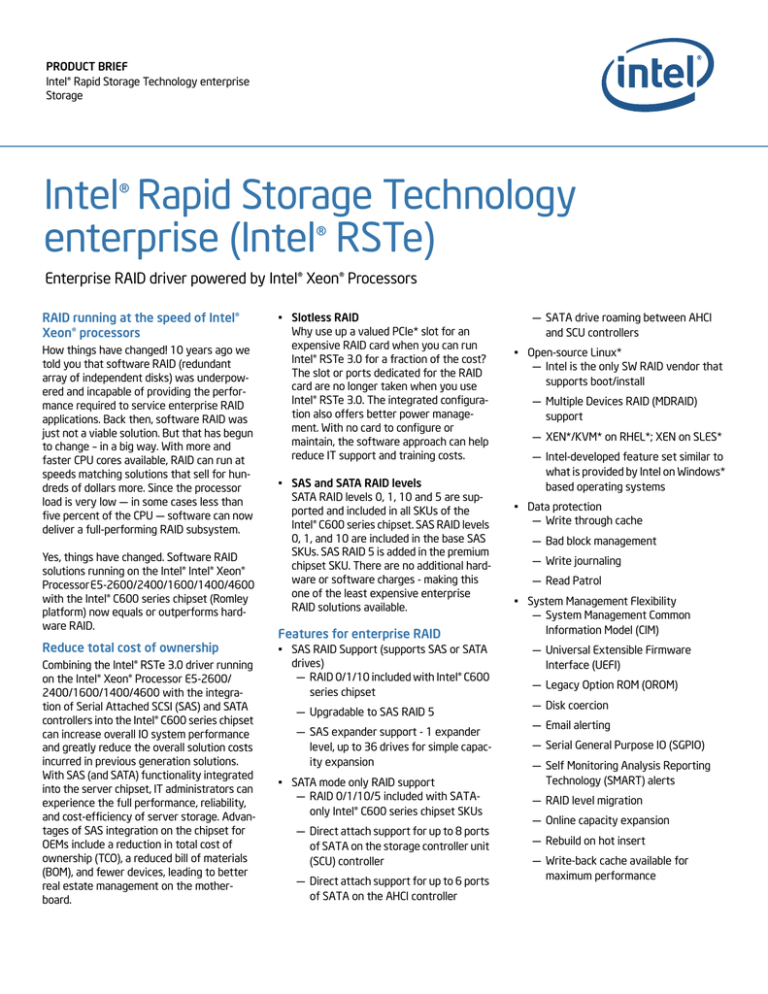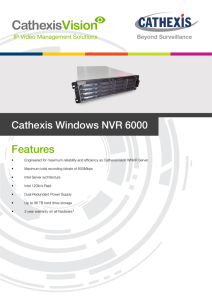
PRODUCT BRIEF
Intel® Rapid Storage Technology enterprise
Storage
Intel® Rapid Storage Technology
enterprise (Intel® RSTe)
Enterprise RAID driver powered by Intel® Xeon® Processors
RAID running at the speed of Intel®
Xeon® processors
How things have changed! 10 years ago we
told you that software RAID (redundant
array of independent disks) was underpowered and incapable of providing the performance required to service enterprise RAID
applications. Back then, software RAID was
just not a viable solution. But that has begun
to change – in a big way. With more and
faster CPU cores available, RAID can run at
speeds matching solutions that sell for hundreds of dollars more. Since the processor
load is very low — in some cases less than
five percent of the CPU — software can now
deliver a full-performing RAID subsystem.
Yes, things have changed. Software RAID
solutions running on the Intel® Intel® Xeon®
Processor E5-2600/2400/1600/1400/4600
with the Intel® C600 series chipset (Romley
platform) now equals or outperforms hardware RAID.
Reduce total cost of ownership
Combining the Intel® RSTe 3.0 driver running
on the Intel® Xeon® Processor E5-2600/
2400/1600/1400/4600 with the integration of Serial Attached SCSI (SAS) and SATA
controllers into the Intel® C600 series chipset
can increase overall IO system performance
and greatly reduce the overall solution costs
incurred in previous generation solutions.
With SAS (and SATA) functionality integrated
into the server chipset, IT administrators can
experience the full performance, reliability,
and cost-efficiency of server storage. Advantages of SAS integration on the chipset for
OEMs include a reduction in total cost of
ownership (TCO), a reduced bill of materials
(BOM), and fewer devices, leading to better
real estate management on the motherboard.
• Slotless RAID
Why use up a valued PCIe* slot for an
expensive RAID card when you can run
Intel® RSTe 3.0 for a fraction of the cost?
The slot or ports dedicated for the RAID
card are no longer taken when you use
Intel® RSTe 3.0. The integrated configuration also offers better power management. With no card to configure or
maintain, the software approach can help
reduce IT support and training costs.
• SAS and SATA RAID levels
SATA RAID levels 0, 1, 10 and 5 are supported and included in all SKUs of the
Intel® C600 series chipset. SAS RAID levels
0, 1, and 10 are included in the base SAS
SKUs. SAS RAID 5 is added in the premium
chipset SKU. There are no additional hardware or software charges - making this
one of the least expensive enterprise
RAID solutions available.
Features for enterprise RAID
• SAS RAID Support (supports SAS or SATA
drives)
— RAID 0/1/10 included with Intel® C600
series chipset
— Upgradable to SAS RAID 5
— SAS expander support - 1 expander
level, up to 36 drives for simple capacity expansion
• SATA mode only RAID support
— RAID 0/1/10/5 included with SATAonly Intel® C600 series chipset SKUs
— Direct attach support for up to 8 ports
of SATA on the storage controller unit
(SCU) controller
— Direct attach support for up to 6 ports
of SATA on the AHCI controller
— SATA drive roaming between AHCI
and SCU controllers
• Open-source Linux*
— Intel is the only SW RAID vendor that
supports boot/install
— Multiple Devices RAID (MDRAID)
support
— XEN*/KVM* on RHEL*; XEN on SLES*
— Intel-developed feature set similar to
what is provided by Intel on Windows*
based operating systems
• Data protection
— Write through cache
— Bad block management
— Write journaling
— Read Patrol
• System Management Flexibility
— System Management Common
Information Model (CIM)
— Universal Extensible Firmware
Interface (UEFI)
— Legacy Option ROM (OROM)
— Disk coercion
— Email alerting
— Serial General Purpose IO (SGPIO)
— Self Monitoring Analysis Reporting
Technology (SMART) alerts
— RAID level migration
— Online capacity expansion
— Rebuild on hot insert
— Write-back cache available for
maximum performance
High performance processors power RAID
Today’s RAID combines the performance of software RAID and integrated SAS with the reliability of
hardware features.
• RAID driver runs on the CPU
• Integrated SAS/SATA
• Support for RAID 0/1/10/5
Active and growing open-source
RAID community
Intel is dedicated to support open-source Linux
development. Intel is the only RAID vendor working
to ensure first class support for its RAID format in
the established Linux raid toolset Multiple Devices
Administration (MDADM). In fact, Intel is the leading
contributor to MDADM among all storage vendors.
MDRAID now has a large and growing ecosystem of
industry storage players who are actively developing and disclosing enterprise RAID features to the
open-source RAID community.
Variety of validated Operating Systems
Intel® RSTe 3.0 is validated with a variety of Windows* and Linux* operating systems. Intel® RSTe 3.0 is also validated with virtualized environments such as Microsoft* Hyper-V; and Linux XEN* and KVM*.
Intel® Rapid Storage Technology enterprise 3.0 validated operating systems
Windows*
Validated Operating System1
Microsoft Server 2008R2 Enterprise (x64)
Microsoft Server 2008 Enterprise (x32 and x64)
Microsoft Server 2003 Enterprise SP2 (x32 and x64)
Microsoft Windows 7 SP1 (x32 and x64)
Windows Vista SP2 (x32 and x64)
Linux*
Red Hat Enterprise Linux Server* (x32 and x64)2
Virtualization
SUSE SuSE Linux Enterprise Server* (x32 and x64)3
Hyper-V*
Xen*
KVM*
1. The listing of an operating system in the table indicates only that it is being used by Intel for Romley platform validation. The listing of an OS in the table does not imply that Intel
has completed Romley platform validation with it, or that the platform has full support from the OS supplier. Contact your OS supplier to learn more about support for the Romley platform. Intel is not validating or certifying OS for the Romley platform and related silicon. Customers are responsible for certification of operating systems on their platform. They may
validate additional operating systems and/or platform features that are not validated by Intel and claim support on their platforms.
2. Contact Red Hat for details.
3. Contact SUSE for details.
For more information, visit www.intel.com/go/raid
INFORMATION IN THIS DOCUMENT IS PROVIDED IN CONNECTION WITH INTEL® PRODUCTS. NO LICENSE, EXPRESS OR IMPLIED, BY ESTOPPEL OR OTHERWISE, TO ANY INTELLECTUAL PROPERTY RIGHTS IS
GRANTED BY THIS DOCUMENT. EXCEPT AS PROVIDED IN INTEL’S TERMS AND CONDITIONS OF SALE FOR SUCH PRODUCTS, INTEL ASSUMES NO LIABILITY WHATSOEVER, AND INTEL DISCLAIMS ANY EXPRESS OR
IMPLIED WARRANTY, RELATING TO SALE AND/OR USE OF INTEL PRODUCTS INCLUDING LIABILITY OR WARRANTIES RELATING TO FITNESS FOR A PARTICULAR PURPOSE, MERCHANTABILITY, OR INFRINGEMENT
OF ANY PATENT, COPYRIGHT OR OTHER INTELLECTUAL PROPERTY RIGHT. UNLESS OTHERWISE AGREED IN WRITING BY INTEL, THE INTEL PRODUCTS ARE NOT DESIGNED NOR INTENDED FOR ANY APPLICATION
IN WHICH THE FAILURE OF THE INTEL PRODUCT COULD CREATE A SITUATION WHERE PERSONAL INJURY OR DEATH MAY OCCUR.
Intel may make changes to specifications and product descriptions at any time, without notice. Designers must not rely on the absence or characteristics of any features or instructions marked “reserved” or
“undefined.” Intel reserves these for future definition and shall have no responsibility whatsoever for conflicts or incompatibilities arising from future changes to them. The information here is subject to change
without notice. Do not finalize a design with this information.
The products described in this document may contain design defects or errors known as errata which may cause the product to deviate from published specifications. Current characterized errata are available on
request. Contact your local Intel sales office or your distributor to obtain the latest specifications and before placing your product order. Copies of documents which have an order number and are referenced in
this document, or other Intel literature, may be obtained by calling 1-800-548-4725, or by visiting Intel’s Web site at www.intel.com.
Copyright © 2012 Intel Corporation. All rights reserved. Intel, the Intel logo, and Core are trademarks of Intel Corporation in the U.S. and other countries.
*Other names and brands may be claimed as the property of others.
327411-001US



